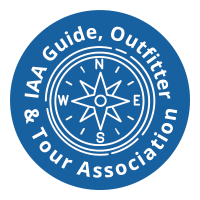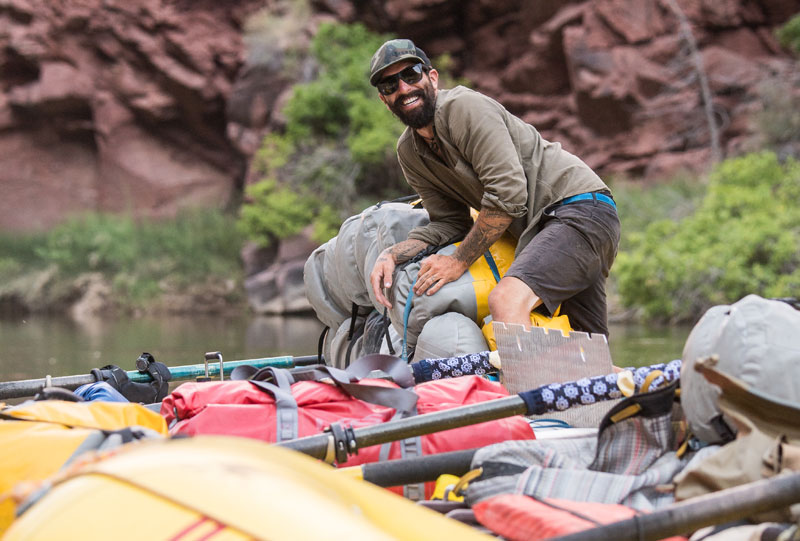Oftentimes if you ask a river guide what led them to this career they’ll tell you one of their parents was a guide or they grew up doing river trips with their family and discovered their love of whitewater early on. But for others like OARS Dinosaur guide, Lee Bassett, they stumble upon their “dream job” later in life.

After a term in the Marines out of high school and seven years working as a tattoo artist in Colorado, a rafting trip on the Arkansas River was what changed everything for Lee.
“Our guide was an older guy named Dan Kay, and I was like, ‘Wow, this guy’s got the dream job,’” recalls Lee. “I was spending all my free time outside, doing outdoor things, and then would stay inside drawing and tattooing all day, which was great, but it wasn’t really my passion.”
“So I didn’t even have an email address—actually, I had to make one—and then I applied for OARS Guide School,” says Lee.
He showed up for guide school in Vernal, UT the following spring “totally green,” according to Lee, but literally dove in head first to show he had what it takes to be a guide.
“I didn’t have any gear, it was snowing, and I was wearing a wetsuit that OARS gave me,” he says.
“I was like, ‘Well, I want to get a job, but don’t have any actual skills, so I better show them that I’m into it,” he continues. “I kept swimming and jumping back in the water with the, ‘If you’re going to be dumb, you better be tough,’ kind of mentality.”
That was 2014. Lee, who took OARS Top Guide honors in 2019, has been a part of the company’s Dino crew ever since and now plays an integral role in leading the same guide school where he got his start. We caught up with him recently to find out more about learning the ropes, what he loves about guiding in Dinosaur National Monument and why people need to take river trips now more than ever.
Get to Know OARS Dino Guide Lee Bassett

What was guide school like?
We did Split Mountain and the daily stretch there was maybe 9,000 CFS (cubic feet per second). Not knowing anything, I remember thinking, “We’re going to raft this? This is crazy.” Now I look at it and I’m like, “Oh, this is no problem at all.” But at the time I thought it was insane. Day two we started doing swiftwater rescue. They threw us right in. I remember being like, “Wow, yesterday I really had never been rafting and today I’m setting up 5-to-1 anchors and swimming in the snow.”
At what point during that experience did you feel like you had what it takes to be a professional guide?
I was told that it takes a lot longer than a week to learn how to get a boat downstream, which is totally true, because I’ve been doing this for a while now and I learn new things all the time. It’s not so much about knowing how to row the boat, tie the knots and all that stuff right out of the gate. OARS was looking for hardworking team players. So I thought, “I’m going to try harder than everybody else, and hopefully walk away with something.” And that’s kind of been my approach to the whole journey.
What do you love most about your job?
I love the wilderness, the whitewater, my co-workers and the guests. I love detaching from society, and that the moment you pull off the beach, nothing else matters. I am doing my dream job…or I could be a walking postman just rocking my iPod and doing my thing.

What makes rafting trips in Dinosaur National Monument so special?
It’s an insanely beautiful place, and I really love that you don’t see a lot of people. It’s so highly regulated, only allowing two commercial and two private launches a day in the monument, that you don’t see a lot of boats. So you get out there, and you truly are in an absolute pristine wilderness environment where things have been protected and unchanged for so long that the bighorn sheep, they’ll walk right by your boat. It’s just a really cool, unique, diverse place. Every other river I go to, I always just want to go back to Dinosaur.
You guide on both the Green and Yampa Rivers in Dinosaur. Do you have a favorite?
It’s kind of a two-part answer. I really love the Yampa, but I would trade that in for high-water Gates of Lodore. When Lodore is screaming at 9,000 CFS, that’s pretty fun.
Is there anything you can’t live without when you’re on the river?
My toothbrush. I am a chronic brusher. People actually laugh about this a lot out there. When I was a kid, my mom was a little bit of a tough love mom when it came to if I got sick or hurt. We never went to the doctor, and if I was hurt or whatever, she would say, “Brush your teeth, you’ll feel better,” which is not really a great diagnosis. So I brush my teeth probably six times a day, and other guides will joke, “Hey, you feeling alright there, bud?” Because they know that if I had a broken arm, my mom would be like, “Brush your teeth.” So yeah, I need my toothbrush…and an economy-sized tub of toothpaste.
What’s something else about yourself that might surprise people?
I read weird, grocery store novels. A lot of people will be out there reading Edward Abbey, and I’m normally reading John Grisham, or some murder-Lifetime-kind-of-book.

What makes you especially proud to be an OARS guide?
I definitely feel like OARS sets a different standard and it’s apparent on the river. Guests know if they’re on an OARS trip that they’re going to have knowledgeable guides, they’re going to have a safe trip, and they’re going to eat really well…I think one of our number one complaints is people say they gain weight on the river, which I don’t doubt one bit.
What has it been like leading trips during the COVID Era?
We got a lot of guests that were really happy with the amount of effort we put into making sure things were clean. I was like, “Hey, you’re going to wash your hands a lot on this trip. We’re going to wear these masks. I’m going to ask you some questions every morning, and take your temperature on your forehead.” I didn’t have anybody have an issue with that. They were all like, “Great, awesome. Cool, let’s do that.”
What do you think guests appreciated the most about being on the river this year, maybe more so than other years?
I definitely think that people appreciate river trips every year, but now more so than ever, it is incredibly therapeutic and rewarding for people to come out and do these trips. With everything that’s going on in the world today—between COVID, financial things, fires, protests and riots—it’s a really good time to just go slow and float down a river. I think it can really reset people.
This interview has been edited for clarity.
Request a Free Adventures Catalog
Photos: Gates of Lodore rafting trip in Dinosaur National Monument – Josh Miller
The post From Rafting Rookie to Top Guide appeared first on OARS.


Recent Comments